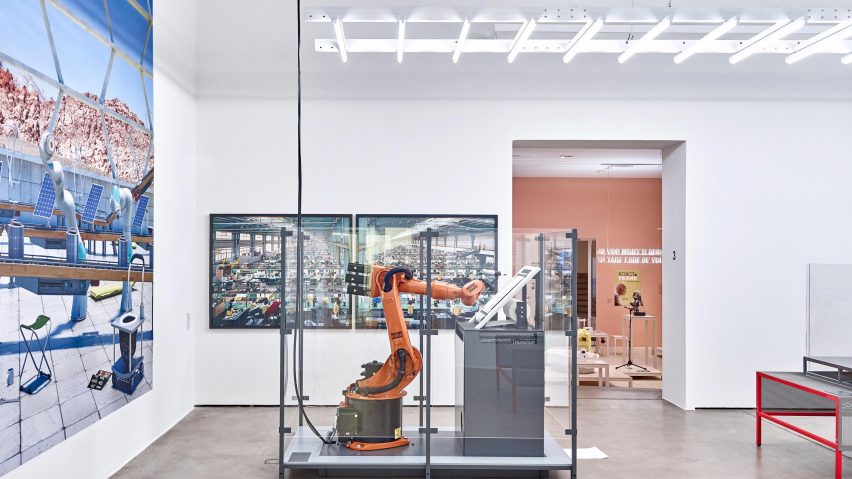"Do you trust robots?", "Could a robot do your job?" and "Do you believe in the death and rebirth of things?" are among the deep questions being posed to visitors at the Vitra Design Museum's latest exhibition.
The Hello, Robot exhibition – the first at the German design museum to focus on robotics – explores the relationship between humans and the intelligent machines that increasingly feature in our lives.
Its 200-plus exhibits include Star Wars' R2D2, an automatic manifesto generator, a smart sofa and a robot-made pavilion.
The exhibits are framed by 14 questions that aim to make visitors think beyond the current conversation around robots, which exhibition curator Amelie Klein describes as "ambivalent".
"The exhibition looks at how we interact and relate to this new species, the robot," Klein told Dezeen at the opening of the show. "What we're doing here is a journey. On this journey the visitor finds 14 questions, and these questions are really meant to invite dialogue and the reflection on how we want to deal with this new technology – as individuals but also as a society."
The questions, posed on overhead signs, guide visitors through the various rooms of the exhibition. The first room of the exhibition – a "cabinet of curiosities" – is filled with representations of robots from popular culture and asks "Have you ever met a robot?".
Exhibits in this room include Star Wars' lovable droid R2D2, a Gundam suit from the Japanese mecha franchise, Nintendo's 80s-era Robotic Operating Buddy and an installation specially commissioned from ECAL students.
An adjoining room – quizzing "are robots our friends or our enemies?" – contains a Pokedrone, the drone that lets users play Pokémon Go from their couches, and a Blabdroid, a cute cardboard robot that records people sharing their secrets.
Trust and care between robots and humans comes to the fore in the room asking "do you want a robot to take care of you?" and "how do you feel about objects having feelings?".
This room includes Paro, the fluffy robot seal that is used in therapy, and Carlo Ratti's Internet of Things sofa, which can be modified with an app or hand gestures. It also explores the new funeral ceremonies that have arisen for the already obsolete Sony robot dog, Aibo.
"The role of design in robotics is to protect human values," said Klein. "The difference between well-meant care, patronising, control and spying are very fluid."
"This is really where design comes into the discussion because it's a political and design decision whether you design an object in a way that streams everything online into the cloud without you deciding as a human, or whether you make this transparent and allow the user to stream whatever he wants to be streamed."
"I think it's extremely important for people to realise that what we speak about when we speak about design in the 21st century is interaction and relationships," she added.
Asking "could a robot do your job?" and the follow-up question "do you want to become a producer yourself?", another room in the exhibition looks at robotic construction, 3D printing and other industrial applications of robotics.
This room includes the manifesto-writing robot arm Manifest, MX3D's 3D-printed bridge. The theme continues outside, where the University of Stuttgart's robot-made and extraordinarily lightweight Elytra Filament pavilion has been erected.
The final room looks at the merging of humans and machines, asking "do you want to become better than nature intended?" and "would you live in a robot?".
The Hello, Robot exhibition is on at the Vitra Design Museum in Weil am Rhein until 14 May 2017. The museum is part of the Vitra Campus, where the brand's production facilities sit among buildings like Zaha Hadid's Fire Station and Herzog & de Meuron's stacked VitraHaus.
Hello, Robot will later embark on a tour, including to the MAK in Vienna and Design Museum Gent, which are presenting partners.
The exhibition is accompanied by a book that – true to theme – has been laid out by an algorithm.

